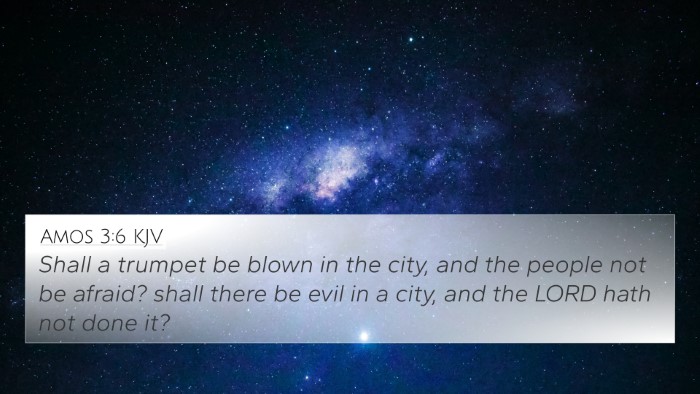Understanding 1 Samuel 6:9
Bible Verse: 1 Samuel 6:9 - "And see, if it goes up by the way of his own coast to Bethshemesh, then he hath done us this great evil: but if not, then we shall know that it is not his hand that smote us: it was a chance that happened to us."
Verse Meaning and Interpretation
This verse is situated within the narrative concerning the Ark of the Covenant which the Philistines had captured and subsequently returned to the Israelites. In this context, the verse highlights a discernment process to determine God's will and intervention.
Key Themes:
- Divine Intervention
- Human Response to God’s Will
- Understanding Chance vs. Divine Action
Commentary Insights
Matthew Henry: Henry emphasizes the importance of recognizing God's hand in our circumstances. He suggests that the Philistines are acknowledging the need for a sign from God to ascertain whether the afflictions they faced were of divine origin or mere coincidence.
Albert Barnes: Barnes highlights the significance of the Ark’s journey back to Israel. He argues that the route taken by the cart carrying the Ark serves as a divine sign, potentially indicating God's favor or displeasure towards the Philistines.
Adam Clarke: Clarke elaborates on the cognitive process the Philistines undertake. They conclude that if the Ark returns to its own people efficiently, it signifies divine displeasure towards them for capturing the Ark, whereas if it does not, they may dismiss their previous assumptions of divine wrath.
Bible Cross-References
1 Samuel 6:9 connects with several other Scriptures, providing a broader biblical context:
- Exodus 25:22 - Discusses God's presence above the mercy seat, linking to the significance of the Ark.
- 1 Samuel 5:6-12 - Details God’s judgment upon the Philistines, setting the stage for this narrative.
- Psalm 115:3 - Highlights God's sovereignty, underlining that He does as He wills, which applies to the events in 1 Samuel.
- Isaiah 42:16 - Speaks of God leading His people in ways they do not know, relating to discernment in 1 Samuel 6:9.
- Jeremiah 10:5 - Contrasts the living God with idols, as recognized by the Philistines in their consultation of the Ark's fate.
- 1 Samuel 7:2 - Continues the narrative of the Ark’s influence upon Israel after its return.
- Romans 8:28 - Emphasizes that God works all things together for good, applicable to interpreting the events happening to the Philistines.
- Acts 8:23 - Discusses the need for discernment in spiritual matters, akin to the Philistines' desire to know God’s will.
- 2 Chronicles 30:9 - Illustrates the concept of seeking the Lord and His favor in contrast to the events experienced by the Philistines.
- Proverbs 16:9 - Indicates the human plans contrasted with God's directing of steps, relevant to the Philistines' dealings with the Ark.
Comparative Analysis
By examining 1 Samuel 6:9 alongside these related verse references, we can gain deeper insights into:
- The Sovereignty of God: How God's will surpasses human understanding, demonstrated by historical events in Israel's narrative.
- Idolatry and Divine Authority: The relationship between nations and their gods as shown in the story of the Philistines.
- Judgment and Mercy: God's disciplinary methods and how they prompt a response of seeking Him.
Thematic Connections
Examining this verse alongside others reveals:
- Evidence of God's direct involvement in human affairs, pressing the need for an understanding of personal responsibility.
- The fine line between recognizing God's actions and interpreting events as mere coincidence, which is a common theme throughout Scripture.
- A call to discernment in spiritual matters, urging believers to seek divine guidance actively.
Tools for Further Study
To explore these themes deeper, consider utilizing:
- Bible Concordance: Helps locate verses related to themes in 1 Samuel 6:9.
- Bible Cross-Reference Guide: Aids in finding similar texts throughout the Scriptures.
- Cross-Reference Bible Study: Techniques that allow for thematic connections and comparisons across books of the Bible.
Conclusion
1 Samuel 6:9 reveals not only the desperation of the Philistines but also a poignant example of the universal human quest for understanding God's workings. As we explore its meaning through biblical cross-references, we gain insights into God’s sovereignty, the complications of interpreting divine action, and the necessity for discernment in faith.










